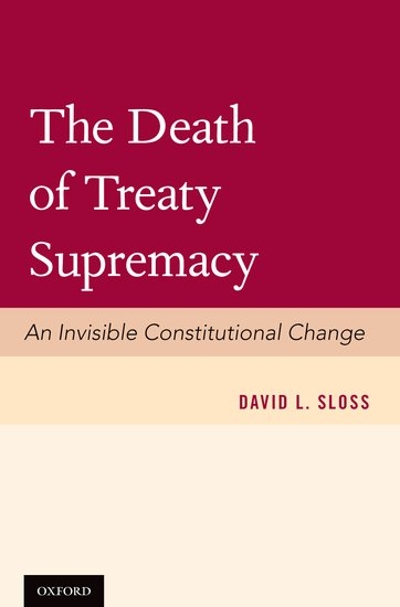GLAS Book Talk with David Sloss

The Center on Globalization, Law, and Society will host a book talk with Professor David Sloss (Santa Clara University) discussing his newest book: The Death of Treaty Supremacy: An Invisible Constitutional Change (Oxford University Press, 2016), winner of the 2017 American Society of International Law book award for Preeminent Contribution to Creative Scholarship.
March 9, 2017
12:05–1:00pm
LAW 3500
Professor David Sloss is an internationally renowned scholar who has published three books and numerous law review articles addressing the application of international law in domestic courts. His scholarship in this area is informed by a decade of experience in the federal government, where he helped draft and negotiate several major international treaties. Professor Sloss serves frequently as a consultant for U.S. attorneys who seek advice on the domestic application of international law in U.S. courts.
Prior to joining the Santa Clara University School of Law faculty, Professor Sloss taught for nine years at Saint Louis University School of Law. Before Sloss started his teaching career, he worked as a litigation associate at Wilson, Sonsini, Goodrich & Rosati in Palo Alto and clerked for Senior Judge Joseph T. Sneed, U.S. Court of Appeals, Ninth Circuit, San Francisco. He also worked for the U.S. Arms Control and Disarmament Agency for nine years before he attended law school. During that time Sloss helped draft and negotiate three major East-West arms control treaties.
The Death of Treaty Supremacy: An Invisible Constitutional Change
Oxford University Press 2016
This book provides the first detailed history of the Constitution's treaty supremacy rule. It describes a process of invisible constitutional change. The treaty supremacy rule was a bedrock principle of constitutional law for more than 150 years. It provided that treaties are supreme over state law and that courts have a constitutional duty to apply treaties that conflict with state laws. The rule ensured that state governments did not violate U.S. treaty obligations without authorization from the federal political branches. In 1945, the United States ratified the UN Charter, which obligates nations to promote human rights “for all without distinction as to race.” In 1950, a California court applied the Charter’s human rights provisions along with the traditional supremacy rule to invalidate a state law that discriminated against Japanese nationals. The implications were shocking: the decision implied that the United States had abrogated Jim Crow laws throughout the South by ratifying the UN Charter. Conservatives reacted by lobbying for a constitutional amendment, known as the Bricker Amendment, to abolish the treaty supremacy rule. The amendment never passed, but Bricker's supporters achieved their goals through de facto constitutional change. Before 1945, the treaty supremacy rule was a mandatory constitutional rule that applied to all treaties. The de facto Bricker Amendment converted the rule into an optional rule that applies only to “self-executing” treaties. Under the modern rule, state governments are allowed to violate national treaty obligations—including international human rights obligations—that are embodied in “non-self-executing” treaties.
Recent blog posts by Professor Sloss:
Oxford University Press blog >
European Society of International Law >
For more information or to request reasonable accommodations for a disability, please email centers@law.uci.edu
